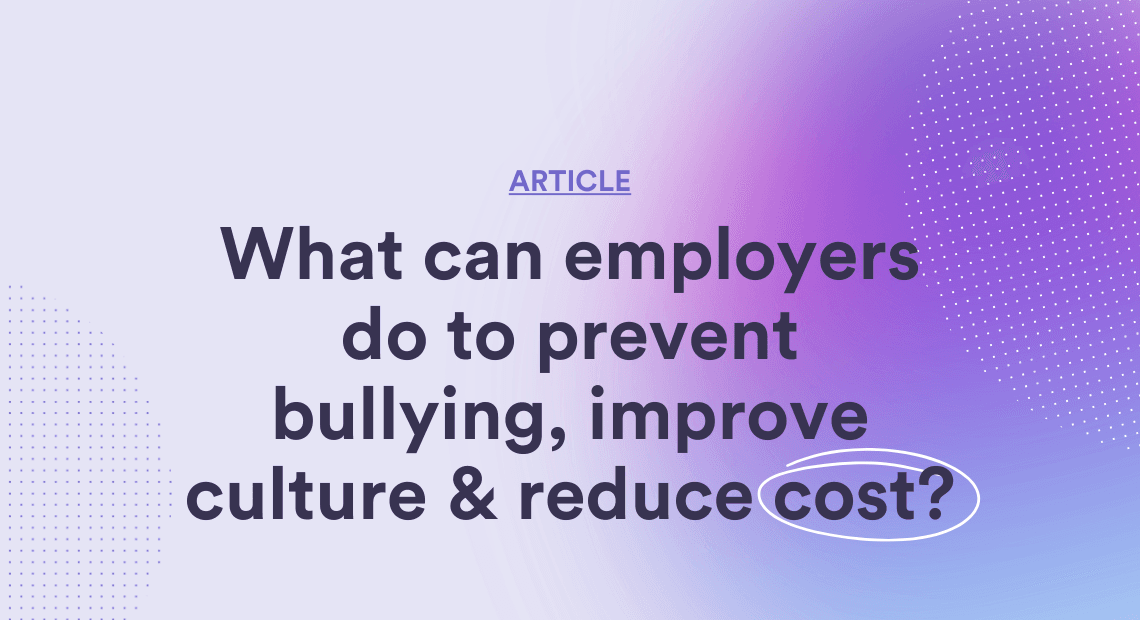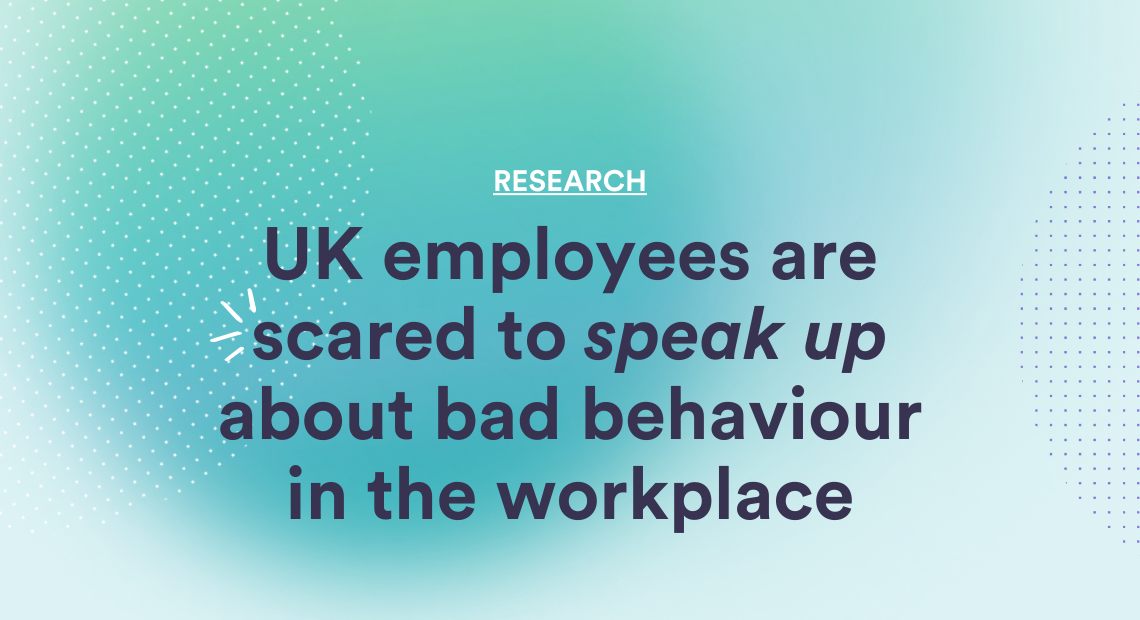Workplace bullying and harassment is a major problem for employers and affects more than 9 million workers in the UK – that’s more than the population of Wales and Scotland combined. Collectively it costs UK businesses £18 billion per year and according to TUC, it’s the second biggest workplace issue after stress. Acas receives over 20,000 phone calls each year in relation to bullying, signalling it’s a widespread issue that is not being dealt with effectively.
There’s much more to bullying than just the financial implications for employers. It can have long term consequences for employees in terms of mental and physical health, but it also has a negative impact on workplace culture, productivity and innovation which directly affects your bottom line.
Bullying statistics in the UK workforce
Bullying is a widespread problem in workplaces across the UK and the CIPD estimates that since 2019, there’s been a 14% rise in reports of bullying and harassment.
Victims of bullying
- 29% of the UK workforce have experienced bullying**
- 80% of workers have experienced some sort of cyber bullying***
- 30% have witnessed bullying at work**
Who is doing the bullying
- 43% of workplace bullying victims reported harassment stemmed from a line manager*
- 37% said bullying came from a colleague* (CIPD)
How bullying is dealt with
- 36% of workers who experienced conflict believed it had been fully resolved*
- 53% of those who are bullied never report it**
- One third of workers who report bullying leave their job***
Cost of bullying to UK businesses
Toxic behaviour costs UK employers £18 billion per year.
Bullying and harassment contribute to a poor workplace culture, that contributes to poor mental health, increased sickness absence levels, low levels of productivity and low employee engagement.
The statistics below show a breakdown of some of the costs associated with bullying:
- An estimated 17 million working days are lost each year to bullying
- Mental ill-health costs the UK workforce £33-42 billion per year, stemming from poor workplace culture
- Cost to rehire and retrain new employees – the average cost in the UK to hire a new employee is £6,125 but can vary depending on the role
- Talkspace estimates that just one bully can cost a business upwards of £100,000 annually
- Reputational damage – loss of sales
- Reduced productivity, low morale
- Legal and compensation costs – the UK government estimates that the total annual cost to employers from harassment and discrimination is approximately £158 million, including legal defence, compensation, and settlements. Sexual harassment alone contributed around £1.4 million annually, primarily through legal and settlement fees
Wider issue of bullying in the workplace
Bullying and harassment at work goes beyond financial pressure for employers and has a much wider impact, both on the individual and the organisation.
Beyond the financial implications, bullying and a poor culture can also lead to:
- High sickness absence levels – putting staff under increased pressure, leading to even higher levels of presenteeism and increased errors
- High staff turnover – employees leaving their jobs at a quicker rate than you can replace them
- Reduced productivity and low morale – when the work environment is hostile, mental health is poor and staff are under pressure, morale can be low and a breeding ground to spread discontent, reducing productivity and output. Employees don’t want to work together, leading to decreased teamwork and problem solving
- Low levels of confidence – employees begin to disconnect from both colleagues and management, with low levels of confidence both in themselves and in the leadership team
What can business leaders do to prevent bullying and reduce costs?
Whilst policies, procedures and training are an essential component of tackling bullying, that alone is not enough. Organisations need to go beyond policy and standard training to build psychological safety, to facilitate individuals speaking up to tackle the wider culture, addressing root causes and active prevention strategies.
Build an inclusive speak up culture
Developing a speak up culture takes time and requires a multi-faceted approach using all or some of the examples we explore below. Building a true speak up culture goes beyond compliance and box-ticking. It requires leaders to lead by example, demonstrating the behaviours that they expect from their team and confidence to call out poor behaviour.
Creating psychological safety is at the heart of speak up culture, creating an environment where employees feel safe to raise concerns without fear of repercussions is key to eliminating bullying. Speaking up needs to be normalised, supported and embedded into the everyday culture of the business.
Improve reporting mechanisms
With line managers most likely to instigate bullying and over 50% of employees not reporting bullying, it is vital that organisations improve their reporting mechanisms.
Traditional reporting routes through HR or line managers may deter people from speaking up about their experiences, especially if the bully is in a position of authority.
By giving employees additional routes to report problematic behaviour that bypasses HR or line-managers, can help build trust and psychological safety, allowing employees to report issues safely, securely and on their own terms.
One of the main barriers to reporting is not being able to do so anonymously.
62% of people would be more likely to report harassment at work if they could do so anonymously. By providing a named or anonymous reporting platform like Culture Shift, it gives employees multiple routes to report, removing barriers to speaking up and centralising all your reports into an all-in-one reporting and case management system.
Responding to complaints and issues promptly
It’s not enough just to put a reporting system in place, leaders and HR teams must respond to complaints swiftly and appropriately. Failing to act can be just as damaging to an organisation.
One of the main reasons employees don’t report bullying is a belief that nothing will be done, or worse, that they will face negative repercussions. This creates a culture of silence and fear, discouraging them from reporting or speaking up in the future.
Those in positions of power must be held accountable for their actions, regardless of seniority. Investigations must be fair, timely, and carried out with integrity. When employees see that their concerns are taken seriously and that meaningful consequences follow, it reinforces the value of speaking up and creates a strong deterrent against future misconduct.
Training and support for line managers
Line managers play a central role in building culture and supporting cultural change in an organisation because they are the link between employees and the leadership team. As the statistics show that line managers are most frequently the instigators of bullying but also the most critical drivers of cultural change, organisations need to take a twofold approach to training.
Firstly, line managers need to be trained in respectful leadership, understanding what constitutes bullying and the consequences for themselves and the organisation of bullying behaviour.
Secondly, managers must be trained to identify and challenge inappropriate behaviour, responding quickly and effectively to complaints. This includes supporting employees who raise concerns, how to have difficult conversations and intervene early to prevent issues from escalating.
Clear policies
Clear policies help organisations set out acceptable types of behaviour and what is expected from employees. Policies should be clearly written, accessible to all staff, and regularly reviewed to ensure they remain relevant and aligned with best practices, whilst regular communication ensures everyone is on the same page.
Use data to put proactive prevention strategies in place
Anonymous reporting software like the one provided by Culture Shift not only supports employees, but it is also a vital tool for leadership teams, giving vital insight into their organisation.
By collecting and analysing internal data on bullying reports, organisations can begin to identify patterns, hotspots, and underlying cultural issues.
This data enables a proactive rather than reactive approach. Instead of waiting for complaints, employers can use data to inform targeted interventions, bespoke training, and other intervention strategies to prevent bullying. Prevention becomes part of the organisational DNA, rather than an afterthought following a crisis.
Without clear data it’s harder to fully understand the issues.
The Culture Shift platform has advanced data reporting capabilities; our dashboards provide at glance KPI metrics so you can easily see headline statistics and reporting hotspots with the ability to dive into the data in more detail to better target your intervention approaches. Analysing your own data allows you to monitor trends over time and the effectiveness of your culture change initiatives.
With the cost of bullying costing UK employers an average of £1,000 per employee†, per year, can you afford not to take action? Discover how Culture Shift can help organisations comply with evolving UK legislation, preventing bullying and harassment in the workplace.




